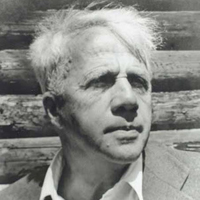Mowing by Robert Frost: Summary and Analysis
Mowing is one of the finest lyrics included in the volume 'A Boy's Will' (1913). The sonnet may be summed up in a single sentence; 'The fact is the sweetest dream that labor knows'. It was written in the year of its appearance.

Robert Frost (1874-1963)
Beside the wood no sound except that of the mower-poet's long scythe was to be heard. The scythe seemed whispering, not speaking loudly, to the earth. The poet knows nothing as to what the scythe whispered. He begins guessing about its whispering - that it might have been about the burning rays of the sun, or it might have been in the form of a complaint about the lack of any other sound. This might have caused its rustling, not raised, sound. Now doing its work, the scythe could not indulge in daydreaming, which is the gift or the result of idle moments. The scythe did not think of the leisure that it would enjoy when the work was over. Neither could it dream of the possible wealth to come from its industry. The scythe has been expressed through the metaphorical use of 'fay or elf' bringing in 'easy gold' or the possible wealth. Nothing could be compared to the sincere love that went into the act of mowing, except the truth of labor. In brief, love and labor alone can complete with each other in cutting the grass and keeping it in rows. The mower saw before him bunches of ripe, hence weak, flowers falling when he was mowing. He was intensely delighted by the beauty of the flowers, and was able to scare a bright green snake. The great truth, referred to in the ninth line, is that work makes man's life full of sweet dreams. The mower's delight springs entirely from doing, and the sweetest dream is the truth. Again he remembers the whispering scythe, and leaves the grass to turn dry.
The poem highlights the dignity of labor. The poet completely identifies himself with his work. At the time of 'mowing' the poet knew only about his 'long scythe', 'the heat of the sun', his 'labor' and 'the hay'. This sonnet may be read along with Birches, After Apple-Picking, Stopping by Woods, Come In, etc. for its theme. Mowing goes with 'earnest love', and this is its theme. In Birches, the poet says that "Earth's the right place for love. This theme of work combined with love is recurrent in Frost. In the poet’s own words, the poem may be interpreted thus: "The youth takes up life simply with the small tasks." By dedicating himself to mowing, by identifying himself with the scythe, the poet would have us believe that the earth is the right place for 'love' and 'labor'.
If the fact- as-dream is interpreted as indicating that the entire reverie reflects an intensely sensuous joy in the immediate human experience, that such pleasurable experience constitutes an end in itself, the poem obviously makes sense in those terms. Taken thus, the poem is clearly related to that fundamental theme of love and cherishing which runs throughout Frost's poetry. Any other meaning found ought not to displace or cancel that. But if the fact-as-dream might also be interpreted to represent the act of mowing as a means to an end as well as an end in itself, it could serve to symbolize not only a process of being but also a process of becoming, within the farmer-poet's life. The grass is cut and the hay is left to make for a hidden purpose.
The sonnet has a moral in the thirteenth line -"The fact is the sweetest dream that labor knows." In this respect, it may be grouped with Mending Wall, Two Tramps in Mud Time, Birches, etc., but the sonnet is free from didacticism. The sonnet abounds in figures of speech, particularly in the use of personification and metaphor. The scythe in the poem is addressed as though it was a living creature. The scythe is mutely likened to a 'fay or elf'. Thus, Mowing is a poem which underlines the significance of work, and which, at the same time, contains artistic excellence.
Related Topics
The Death of the Hired Man: Summary and Analysis
Neither Out Far nor In Deep: Summary and Analysis
West Running Brook: Summary and Analysis
Stopping by Woods on a Snowy Evening: Analysis
A Considerable Speck: Critical Analysis
Mending Wall: Summary and Analysis
Home Burial: Summary and Analysis
After Apple Picking: Summary and Analysis
The Road Not Taken: Summary and Analysis
Fire and Ice: Summary and Analysis
Nothing Gold Can Stay: Summary and Analysis
Acquainted with the Night: Summary and Analysis
The Gift Outright: Summary and Analysis
 |
bachelorandmaster.com |